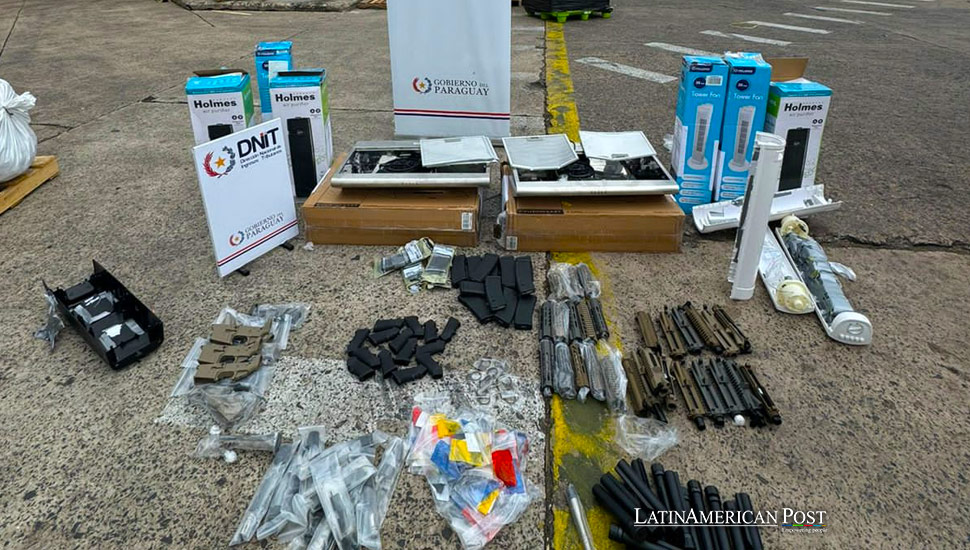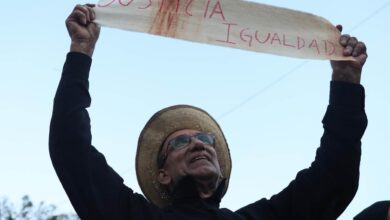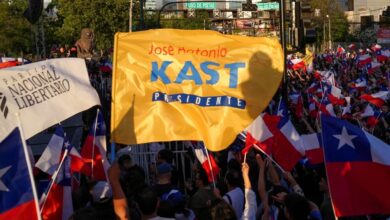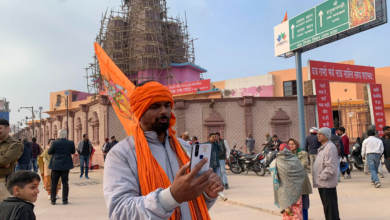Paraguay Seizes Over 200 Heavy Weapon Parts in Major Operation

Paraguayan authorities confiscated more than 200 parts of heavy weaponry in shipments from Miami to Silvio Pettirossi International Airport. This significant seizure highlights ongoing efforts to combat organized crime and illegal arms trafficking in the region.
Paraguayan authorities on Monday seized more than 200 parts for heavy weaponry in shipments sent from Miami, USA, to Silvio Pettirossi International Airport, the country’s main airport serving Asunción. This operation, conducted by customs and the Public Ministry, is a significant step in the fight against organized crime and illegal arms trafficking in the region.
Officials from the National Directorate of Revenue (Dnit) discovered the parts in a shipment that purportedly contained air cleaners, extractors, and fans. The unusually high shipping cost raised suspicions, explained Alberto Tiozzo, the customs administrator at Silvio Pettirossi Airport, in an interview with NPY channel. “We conducted a thorough inspection, scanning the items to see what was inside these devices. That’s when we identified that these parts for weapons were indeed present,” Tiozzo said.
The inspection revealed a shipment weighing approximately 40 kilograms, consisting of 242 parts for heavy weaponry. Additional parts were found in ten more boxes, though the exact quantity is yet to be determined. The Public Ministry reported that the confiscated items included PMAG cartridge magazines, 5.56 assault rifle barrel tubes, and R15 rifle frames, among others.
The case is now under the jurisdiction of Alejandro Cardozo, a prosecutor from the Specialized Unit for the Fight Against Organized Crime. The authorities have not disclosed the identities of the senders or recipients nor the name of the shipping company involved. The seized parts have been handed over to the Directorate of War Materiel (Dimabel), responsible for regulating firearm possession and controlling the import, export, commercialization, storage, and custody of arms and their components.
The Broader Context of Arms Trafficking
This significant seizure sheds light on the broader issue of arms trafficking in Latin America. The region has long struggled with illegal arms trade, which fuels organized crime, gang violence, and insurgency movements. Paraguay, with its central location and porous borders, often serves as a transit point for illegal arms destined for neighboring countries.
The trafficking of arms is a significant contributor to the violence and instability that plague many parts of Latin America. Countries like Mexico, Colombia, and Brazil have faced severe challenges due to the influx of illegal weapons, which empower criminal organizations and undermine public safety. The efforts of Paraguayan authorities to intercept such shipments are critical in the regional fight against these pervasive issues.
Paraguay’s Strategic Role
Paraguay’s Strategic Role Paraguay’s strategic location and its proactive stance make it a key player in the fight against arms trafficking in South America. Due to its central position and the Tri-Border Area, where Paraguay, Argentina, and Brazil meet, the country has become a transit hub for illegal goods, including arms. This area is notorious for smuggling and organized crime activities, and Paraguay’s efforts are crucial in combating these issues.
Efforts to combat arms trafficking in Paraguay involve multiple agencies and international cooperation. The recent seizure at Silvio Pettirossi International Airport is part of a broader strategy to tighten security and improve surveillance at key entry points. By intercepting these shipments, Paraguayan authorities are disrupting the supply chain of illegal arms and sending a strong message to criminal networks operating in the region.
The involvement of Dimabel in this case underscores the importance of regulating and controlling firearm possession and trade. Dimabel’s mission includes overseeing arms importation, exportation, and commercial activities, ensuring that legal frameworks are followed, and preventing illegal arms from entering the market.
Regional Cooperation and Future Challenges
Regional Cooperation and Future Challenges the fight against arms trafficking requires robust regional cooperation. Latin American countries must work together to share intelligence, coordinate operations, and strengthen legal frameworks to combat the flow of illegal arms effectively. This includes enhancing border security, improving customs procedures, and fostering collaboration between law enforcement agencies across borders. The potential for effective action when resources and efforts are coordinated gives hope for a more secure future.
Paraguay’s recent success in intercepting a significant shipment of weapon parts highlights the potential for effective action when resources and efforts are coordinated. However, the challenges remain substantial. Criminal organizations are highly adaptive, finding new methods to circumvent security measures and continue operations. Continuous vigilance, advanced technology, and international cooperation are essential to stay ahead of these sophisticated networks.
The broader implications of this seizure extend beyond Paraguay. By disrupting the supply of arms, authorities can help reduce the capacity of criminal organizations to perpetrate violence. This, in turn, can contribute to more excellent stability and security in the region, fostering economic growth and development conditions. The potential impact of such operations on the overall security and prosperity of the region is significant and should not be underestimated.
Paraguayan authorities’ seizure of over 200 heavy weapon parts at Silvio Pettirossi International Airport marks a significant victory in the fight against organized crime and illegal arms trafficking. This operation underscores the critical role that thorough inspections and international cooperation play in curbing the flow of illicit weapons in Latin America.
As Paraguay continues to bolster its efforts against arms trafficking, the importance of regional cooperation cannot be overstated. The challenges are immense, but with sustained commitment and collaborative strategies, it is possible to make significant strides in enhancing regional security and stability.
The fight against arms trafficking is not just about intercepting shipments; it is about disrupting the networks that thrive on violence and exploitation. By addressing this issue head-on, Paraguay and its neighbors can pave the way for a safer and more prosperous future for all.





